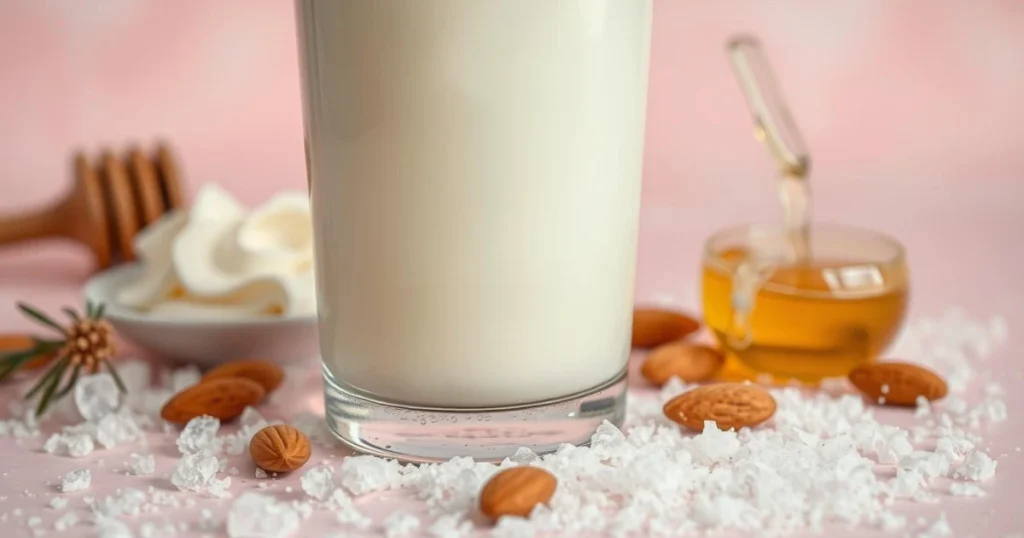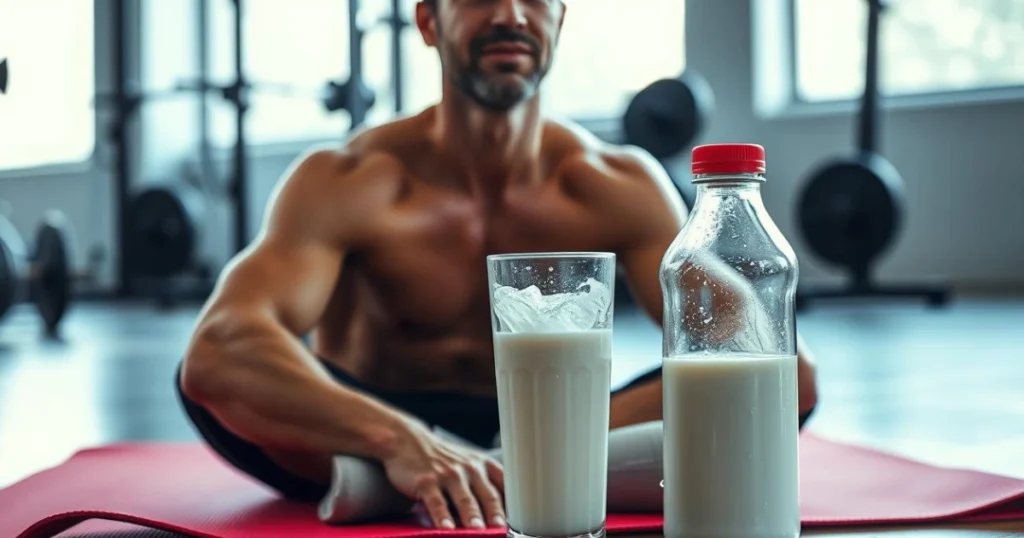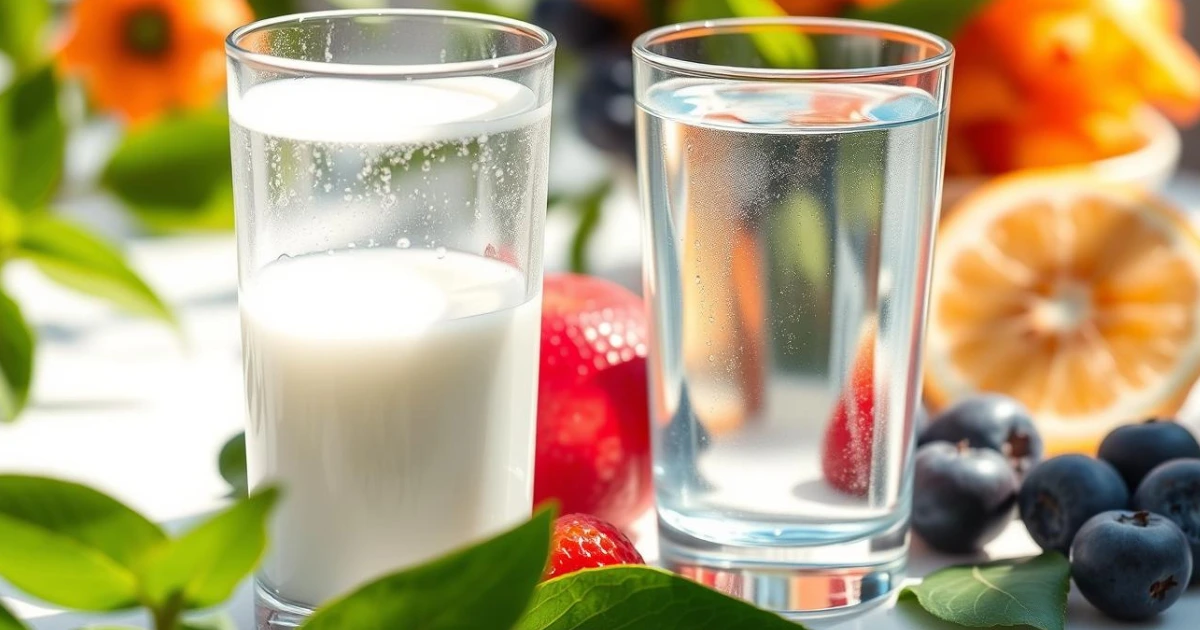Is Milk More Hydrating Than Water? Here’s the Truth
Is Milk More Hydrating Than Water? As the summer sun gets hotter, staying hydrated is key. But is water the best choice for this? Recent studies show milk might be better at keeping us hydrated.
We’ve always thought water is the best for staying hydrated. But new research is changing that. Milk, with its 87% water and special mix of nutrients, could be the hydration secret we’ve been missing.
Table of Contents
Understanding Hydration Basics and Its Importance
Keeping your body hydrated is key to staying healthy. Water is about 60% of our body weight. It helps with energy, digestion, keeping us cool, and removing waste.
The Role of Hydration in Body Functions
Having enough fluid balance helps our cells, tissues, and organs work right. It’s good for our brain, gut, kidneys, and skin. If we lose too much water, we might feel tired, have trouble focusing, and feel bad.
Daily Fluid Requirements for Optimal Health
Men should aim to drink around 15.5 cups (3.7 liters) of water each day, while women should strive for 11.5 cups (2.7 liters). However, your daily water intake may vary depending on factors such as age, physical activity, and climate. Drinking more water is a good idea when you’re exercising or it’s hot outside.
Common Signs of Dehydration
- Thirst
- Dizziness
- Weakness
- Headache
- Dry skin
- Dry mouth
- Fatigue
- Amber-colored urine
Severe dehydration can cause serious problems. These include not being able to pee, low blood pressure, fast heart rate, fever, feeling very tired, confused, and even seizures or coma. It’s very important to keep your hydration levels right for your health.
Is Milk More Hydrating Than Water? Scientific Evidence
Many studies show that milk is better at hydrating than water. A beverage hydration index study found that milk, both fat-free and whole, hydrates better than water and sports drinks. This is true for both kids and adults, as milk keeps fluids in the body longer than water or sports drinks.
In 2016, a study in the American Journal of Clinical Nutrition showed something interesting. Fat-free milk was better than water and sports drinks at replacing lost electrolytes and hydrating after exercise. This might be because milk has natural electrolytes and nutrients that help it hydrate better.
| Beverage | Hydration Index |
|---|---|
| Fat-free Milk | 1.02 |
| Whole Milk | 1.00 |
| Water | 1.00 |
| Sports Drinks | 0.99 |
The beverage hydration index shows how well a drink hydrates the body. A score of 1.0 means it hydrates as well as water. This shows that milk might be a better choice for staying hydrated than other drinks.
“Milk, being approximately 90% water, is deemed a good source of hydration, particularly beneficial during summer months to combat dehydration.”
Cow’s milk is full of electrolytes like sodium and potassium. These help replace what’s lost when we sweat, making milk a great choice for staying hydrated. The science backs it up: milk might be better at hydrating than water, especially after working out.
The Unique Composition of Milk for Hydration
Milk is special for staying hydrated. It has electrolytes, proteins, and carbs that help balance fluids in the body. This makes it great for keeping you hydrated.
Natural Electrolytes in Milk
Milk has important electrolytes like sodium, potassium, calcium, and magnesium. These help keep the right amount of fluid in the body. They also support muscle and nerve function.
The mix of electrolytes in milk helps replace what’s lost when you sweat or go to the bathroom. This is especially true when you’re active or it’s hot outside.
Protein and Carbohydrate Content
Milk’s proteins, like whey and casein, help keep water in your body longer. This means you stay hydrated for more time. The carbs in milk, mainly lactose, also help keep you hydrated for longer.
Essential Nutrients That Support Hydration
- Milk is full of vitamin D, which helps your body absorb calcium. This is key for fluid balance.
- It also has vitamin B12, important for making red blood cells and energy.
- The calcium in milk is good for bones and muscles. This helps with hydration too.
In short, milk’s mix of electrolytes, proteins, carbs, and vitamins and minerals makes it great for staying hydrated. It supports your body’s functions well.
How Milk’s Natural Sugars Enhance Hydration
Milk is more than just a drink. It’s a natural powerhouse for hydration. Its unique mix, especially the natural sugars like lactose, is key. Unlike sugary drinks, milk’s sweetness is just right for hydration.
The sugars in milk, like lactose, help with hydration. Milk helps maintain stable blood glucose levels. This balance is vital for keeping your cells hydrated. Milk’s sugar content helps it hydrate better than plain water or sugary drinks.
Also, milk’s natural electrolytes, like sodium and potassium, work with sugars for better hydration. This mix of nutrients helps your body hold onto fluids longer. This means you stay hydrated for longer.
“Milk’s natural sugars help maintain hydration while providing a balanced sweetness that doesn’t overwhelm the body”
So, when you need to drink and stay hydrated, choose milk. Its sugars and electrolytes make it better than many drinks. It’s a tasty and healthy way to stay hydrated.

The Role of Electrolytes in Milk’s Hydrating Properties
Milk is more than just a drink. Its special mix helps it hydrate better than water. The balance of electrolytes in milk is key to its hydrating power.
Sodium and Potassium Balance
The sodium and potassium in milk help keep the body’s fluid balance right. These electrolytes work together in the sodium-potassium pump. This process helps water move across cell membranes.
Milk helps keep you hydrated, especially after working out or losing fluids.
Calcium and Magnesium Benefits
Milk’s minerals, like calcium and magnesium, add to its hydrating effects. Calcium is good for bones and muscles. It helps with calcium absorption, which is key for staying hydrated.
Magnesium is important for magnesium hydration. It helps keep the body’s electrolyte balance right.
These electrolytes work together, making milk better at hydrating than water in some cases. Milk’s mix of nutrients helps replace what’s lost during exercise or dehydration. It’s a great part of a good hydration plan.
| Electrolyte | Role in Hydration |
|---|---|
| Sodium | Regulates fluid balance and blood pressure |
| Potassium | Maintains muscle function and nerve transmission |
| Calcium | Supports bone health and muscle function |
| Magnesium | Contributes to overall hydration and various bodily functions |
Knowing how these electrolytes help milk hydrate is useful. It helps you choose to drink milk for better hydration. This can improve your health and well-being.
Post-Exercise Hydration: Milk vs. Water
Choosing between milk and water for post-workout hydration is crucial. Research shows milk is better than water for recovery.
A 2016 study found milk better than water and sports drinks for rehydration. It has electrolytes, proteins, and carbs that help with recovery.
Milk is great for keeping you hydrated after a workout. It has sodium and potassium to help your body hold onto fluids.
“Thanks to its superior hydrating properties, milk is an excellent choice for athletes and fitness enthusiasts seeking to boost their recovery and optimize sports nutrition.”
Other drinks like smoothies, sports drinks, and tart cherry juice also help with hydration. The goal is to replace lost nutrients and electrolytes for recovery.

Adding milk and other hydrating drinks to your routine helps your body recover. It supports exercise recovery and sports nutrition.
Understanding Fluid Retention: Why Milk Stays Longer
Milk is better at keeping water in your body than water itself. This is because milk has proteins, carbs, and electrolytes. These ingredients help keep you hydrated for longer.
The Science Behind Absorption Rates
The proteins in milk slow down how fast your body absorbs it. This means the water and nutrients in milk take longer to get into your blood. As a result, you stay hydrated for a longer time. Water, on the other hand, is absorbed and used up faster.
Duration of Hydration Effects
Milk’s mix of electrolytes, proteins, and carbs also helps keep water in your body. This mix helps you stay hydrated for a longer time. Studies show that milk, whether full-fat or skimmed, keeps you hydrated longer than water.
Experts say you should drink no more than three cups of milk a day for best hydration. They also recommend soya milk and cow’s milk over sports drinks for rehydrating after exercise.
“Milk’s composition ensures prolonged hydration, providing lasting benefits that water alone cannot offer”
| Hydration Beverage | Hydration Index | Retention Time |
|---|---|---|
| Full-Fat Milk | 1.23 | Longer |
| Skimmed Milk | 1.21 | Longer |
| Water | 1.00 | Shorter |
The table shows milk is better at keeping you hydrated than water. Both full-fat and skimmed milk have higher hydration indices and stay in your body longer.
Optimal Ways to Include Milk in Your Hydration Strategy
Milk is a great addition to your hydration plan. It’s full of nutrients and has special properties that make it more hydrating than water in some cases. Let’s look at the best ways to add milk to your hydration strategy.
Enjoying milk after exercise is a smart move. Milk’s natural electrolytes, protein, and carbs are perfect for post-workout. They help replace lost fluids and aid in muscle recovery. Choose low-fat or fat-free milk to minimize calorie intake without sacrificing the nutritional benefits.
- Milk can be enjoyed on its own or blended into a refreshing smoothie after exercise.
- Drinking milk with cereal or in a latte can also help meet your hydration needs.
Remember to balance milk with other fluids like water in your hydration plan. Everyone’s hydration needs are different. They depend on your activity level, climate, and health. Adjust your milk and water intake based on your needs.
“Proper hydration enhances body and mind efficiency, keeping the individual feeling strong and running smoothly.”
By adding milk to your daily hydration routine, you get its unique benefits. This helps you stay hydrated, nourished, and energized all day.
Conclusion
Water is key for staying hydrated, but milk has special benefits too. It has electrolytes, proteins, and carbs. Studies show milk is better at hydrating, especially after working out.
Milk’s advantages for hydration benefits include its natural electrolytes and slow absorption. It helps keep you hydrated for longer. This makes milk great for keeping your fluid intake balanced and improving your health optimization.
Whether you’re an athlete, a breastfeeding mom, or just want to stay hydrated, knowing about milk’s hydrating effects is helpful. It helps you make smart choices about your fluid intake and supports your health.

